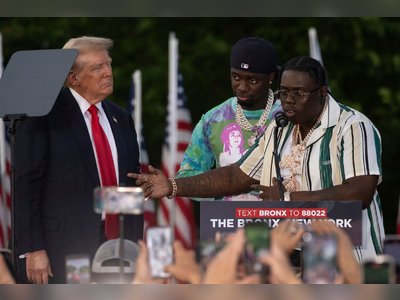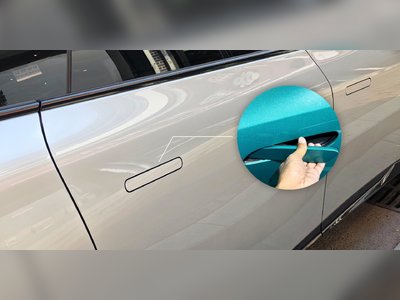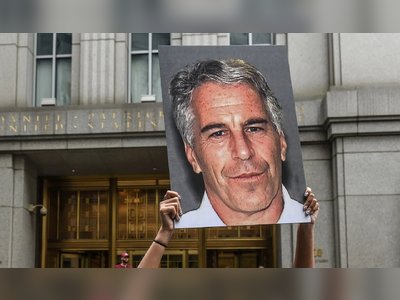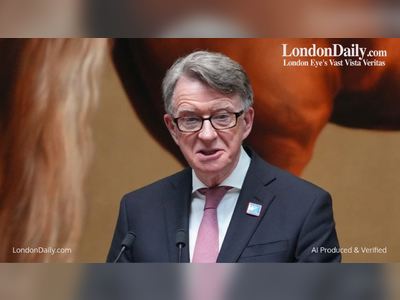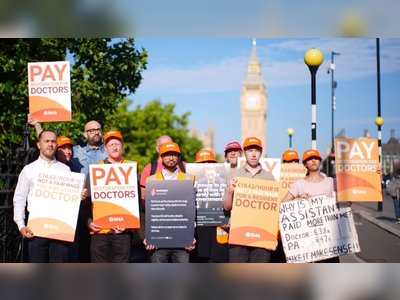
Local elections 2023: Thousands didn't vote due to ID rule, data shows
Information from 160 of 230 councils where polls were held this year shows 26,165 voters were initially denied ballot papers at polling stations.
Of these, 16,588 people came back with valid ID, whilst 9,577 did not return.
This is a relatively small number of voters, although campaigners warn this would not capture all those affected.
England's local elections on 4 May were the first in Britain where people had to show photo ID, such as a passport or driving licence, to vote in person.
The impact of the rule is being closely watched ahead of the next general election, expected to be held in 2024, when it will also be in force.
The Electoral Commission, the elections watchdog, is collecting data from councils and expects to publish an initial analysis of the policy next month.
But some local authorities have begun to disclose headline figures on the number of voters turned away, which have been collected by the BBC.
A fuller picture on the impact of the requirement will take a while to emerge, as more information comes in. Some information collected - including on voters suspected of forging ID - is not being published by councils.
Working out the proportion of eligible voters turned away due to the ID rule is difficult, because of differences in how councils have recorded the data.
Some provided voters denied a ballot as a percentage of those voting at polling stations on the day, with others providing it as a proportion of those eligible to vote in person, or of the total electorate.
Information collected so far suggests the people initially turned away were a small proportion of the overall voter base, generally less than 1% and in many cases less than 0.5%.
This echoes the findings of voter ID trials conducted in 2018 and 2019, which put the proportion of people initially refused a ballot at around 0.4% of the total votes cast.
David Cowling, a former BBC polling expert who is now a visiting research fellow at King's College London, also says it must be borne in mind that some voters initially turned away later return with ID.
He says evidence from metropolitan borough councils, and the pilots, suggests around 60% of people initially refused a ballot return with valid ID - producing a rough figure of 0.2% refusals of the votes cast.
"That's arguably 0.2% fewer people than there should be not participating - but on the other hand, it doesn't seem to me that the death of democracy is on the agenda either," he told BBC Radio 4's More or Less.
He adds, however, that there are "imponderables" in the council data, including the fact that people turned back by so-called greeters outside polling stations were not included in the published figures.
Labour MP Clive Betts, who chairs a Commons committee set to hold its own hearing on the new rules, also said official data would not reflect those who stayed at home, either because they didn't have ID or didn't know whether it would be accepted.
"The numbers of these people could be bigger than those who were turned away," he told the BBC.
He added that even if the number of people denied a ballot was in the thousands, it would be a "thousand times more" than the number of people prosecuted each year for voter fraud.
'One voter too many'
The Electoral Reform Society, a campaign group that opposes voter ID, warned that "far more" people would be turned away at the next general election unless the rule is scrapped.
"These figures, while not a complete picture, show what we've long feared," said Dr Jess Garland, the society's director of policy and research.
"One voter turned away is one too many, but these figures show that the impact was far, far greater."
The Electoral Commission will be collecting information on where greeters were used at polling stations, in order to assess the impact they had.
As well as the data from councils, it has previously said it will also consider information from returning officers, electoral observers, and opinion polling, to reach a "rounded assessment" on voter ID.
Gerrymandering claims
The government announced the voter ID policy in 2021, saying it would tackle voter fraud and boost public confidence in elections.
There have only been a handful of convictions for electoral fraud in recent years - but ministers argue a lack of evidence could be masking the true level.
Ministers also point out that voter ID has been a requirement in Northern Ireland since 2003, as well as in many European countries.
Opposition parties voted against it, arguing it was unnecessary and would hit turnout among marginalised groups. In April, shadow minister David Lammy said Labour would get rid of the rule if it wins power.
Conservative MP Jacob Rees-Mogg, who was in government when the measure was introduced, recently said the Conservatives' move to introduce voter ID had been an attempt at gerrymandering - fixing rules to gain electoral advantage.
But he said the measure had come "back to bite them," claiming that his party's own vote had been hit because older voters, who are more likely to vote Tory, were more likely to lack an accepted form of identity.
Previous government research has found over-85s were less likely to have acceptable ID. Electoral Commission studies have also said this is the case for unemployed people, council housing tenants, and those with lower educational qualifications.
Voters without an accepted form of ID - estimated at around 2 million - were able to apply for a free certificate allowing them to vote. Some 85,000 people - around 4% of the estimate - applied for one online ahead of May's polls.
An official turnout figure for the local elections in England is expected to be available later this year.
Comments




